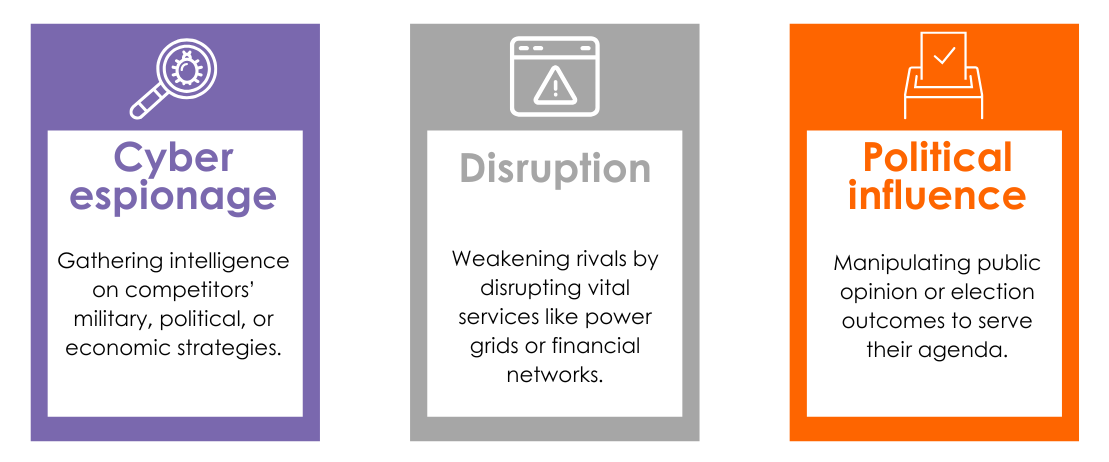Nation-state cyber threats: The rising risk to organisational security
Nation-state cyber threats aren’t new—but today, they’re more intense, far-reaching, and relentless than ever. Once focused on government targets, these attacks now reach essential infrastructure, private corporations, and services we all rely on. Unlike typical cyberattacks, these are calculated moves in a global rivalry, reshaping what organisations like yours need to consider for security.
In this blog, we’ll break down what makes these threats so dangerous, how they’re evolving, and what steps you can take to protect your organisation.
What are nation-state cyber threats?
Nation-state cyber threats originate from government-backed groups with political or military agendas. These actors have vast resources, sophisticated technology, and target organisations like yours to disrupt, spy, or destabilise in support of their national interests.
Common motives include:

These motives mean that even private organisations may become collateral damage in global conflicts.
Why nation-state cyber-attacks are on the rise
With geopolitical tensions high, cyber warfare has become a powerful tool for nations to exert influence without physical conflict. State-sponsored cyberattacks are increasingly used to gather intelligence, destabilise rivals, and assert dominance, leaving organisations vulnerable.
| High-profile nation-state cyber-attacks and economic espionage | Attribution challenges and the need for international cooperation |
|
Attacks like the Medibank and Optus data breaches show just how dangerous these threats are. Nation-state actors frequently engage in economic espionage, targeting intellectual property and trade secrets in healthcare, telecommunications, and defence to boost their economies. These incidents show that the reach of nation-state attacks extends far beyond government entities, affecting private organisations and essential infrastructure. |
Attributing attacks to specific actors is complex because attackers often mask their involvement or disguise actions as hacktivist movements. Given the global nature of these threats, international cooperation is essential. Sharing intelligence and aligning strategies can help organisations, especially in finance, defend against disruptions. |
The impact of nation-state cyber threats on organisational security
Nation-state cyber threats inflict more than just data breaches—they impact finances, intellectual property, data privacy, and your organisation’s reputation.
- Financial loss and business disruption: Nation-state attacks can drain resources through ransom payments, downtime, and recovery efforts. For financial organisations, disruptions can destabilise investor confidence, cause market sell-offs, and create ripple effects across entire economies.
- Intellectual property theft and data breaches Attackers frequently target intellectual property to support their own industries, costing sectors like aerospace, pharmaceuticals, and defence billions. In financial sectors, breaches of customer data weaken market trust. The Australian National University (ANU) breach, for instance, exposed 19 years of sensitive records, impacting personal and financial information.
- Reputational damage: A nation-state cyberattack can severely impact an organisation’s reputation. After the 2022 Optus breach, which exposed nearly 10 million customers’ data, the company faced intense scrutiny over its security practices, leading to a significant loss of trust. For financial institutions, reputational damage can be even more serious, as clients demand robust security measures. Rebuilding trust after a breach can take years, requiring transparency, strong governance, and security upgrades.

How nation-state cyber-attacks are different from traditional cyber threats
Nation-state cyber threats stand out from typical cybercrime for several reasons. They’re motivated by political and economic interests, involve advanced techniques like zero-day exploits and supply chain attacks, and are often embedded within systems long-term (known as Advanced Persistent Threats, or APTs). This level of complexity makes them harder to detect and demands specialised security measures.
Key tactics used in nation-state cyber attacks:
-png.png?width=699&height=358&name=Implementation%20strategy%20(8)-png.png)
- Spear-phishing and social engineering: Attackers exploit human vulnerabilities by building trust and encouraging people to download malware or share sensitive information.
- Supply chain attacks: Compromising third-party vendors to reach a larger target, as seen in the SolarWinds breach, shows the devastating potential of these attacks.
- Zero-day exploits: Attackers exploit unknown vulnerabilities to maintain control over systems undetected.
- Ransomware and wipers: Although ransomware is often financially motivated, nation-state actors increasingly use it to disrupt essential operations. Wiper attacks, which permanently delete data, are particularly destructive, as seen in the 2017 NotPetya attack, which spread from Ukraine to cripple multinational companies like Maersk and Merck.
How you can defend against nation-state cyber threats
To stay protected, proactive monitoring and layered security are essential. AI-driven tools that analyse traffic patterns can help detect unusual activity. Conducting regular vulnerability assessments and maintaining strict vendor management can further strengthen your defences.
- Securing critical infrastructure: Securing essential systems is critical for any organisation. By implementing layered security, conducting regular vulnerability assessments, and ensuring robust access controls, you can fortify your defences against nation-state threats.
- Employee awareness and training: Human error is often the weakest link in cyber security. Training employees to spot phishing and social engineering tactics significantly reduces the risk of an attack. Regular awareness programs keep your team vigilant and prepared.
- Incident response and international cooperation: Having a strong, board-level incident response plan tailored to nation-state threats is critical, especially in sectors like finance where security expertise is essential. Cross-border cooperation and public-private information-sharing further strengthen defences.
- Partnering with a trusted security provider: Working with a cyber security expert like The Missing Link helps protect your organisation. Our Application Security Services include vulnerability assessments, penetration testing, and proactive security measures, providing the support you need to stay ahead of evolving threats.

The future of nation-state cyber threats
As technology advances, nation-state attacks will only grow more sophisticated and harder to detect. With geopolitical tensions likely to persist, cyber warfare will become more complex, requiring organisations to stay vigilant and agile. Effective defence will rely on international cooperation, as nations and organisations align strategies and share intelligence to safeguard critical infrastructure and sensitive data.
Strengthening your defences against nation-state cyber threats
As nation-state cyber threats increase, staying passive is not an option. Strengthen your defences with The Missing Link’s expert security solutions. Contact us today to build a defence strategy that ensures resilience against evolving threats.
Author
As a Content Marketing Specialist at The Missing Link, I turn technical insights into engaging stories that help businesses navigate the world of IT, cybersecurity, and automation. With a strong background in content strategy and digital marketing, I specialise in making complex topics accessible, relevant, and valuable to our audience. My passion for storytelling is driven by a belief that great content connects, educates, and inspires. When I’m not crafting compelling narratives, I’m exploring new cultures, diving into literature, or seeking out the next great culinary experience.
- What are nation-state cyber threats
- Why nation-state cyber-attacks are on the rise
- The impact of nation-state cyber threats on organisational security
- How nation-state cyber-attacks are different from traditional cyber threats
- How you can defend against nation-state cyber threats
- The future of nation-state cyber threats
